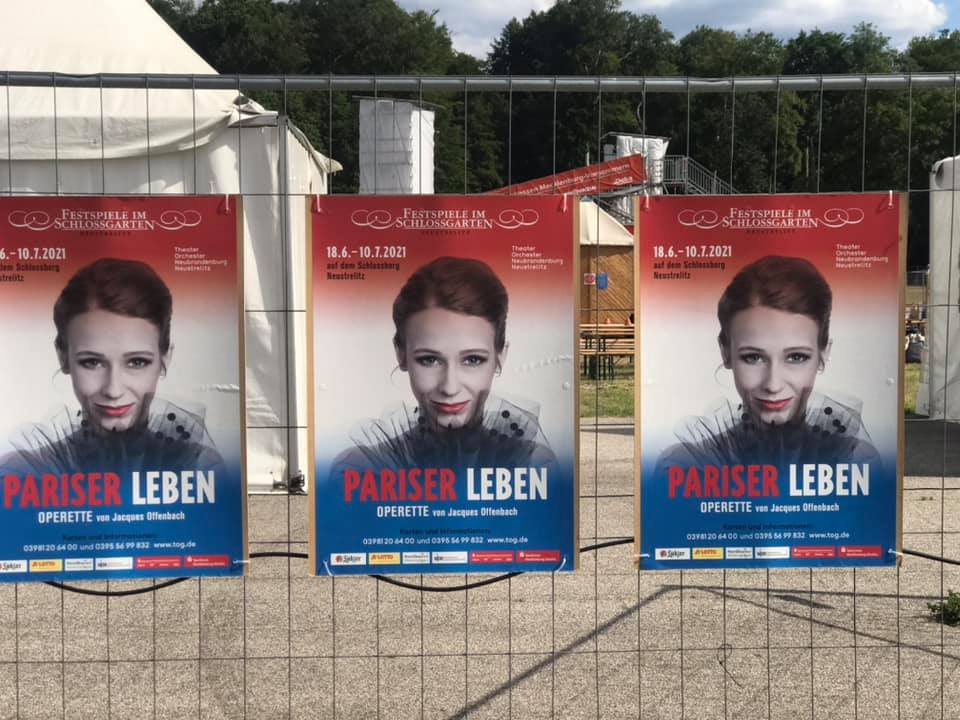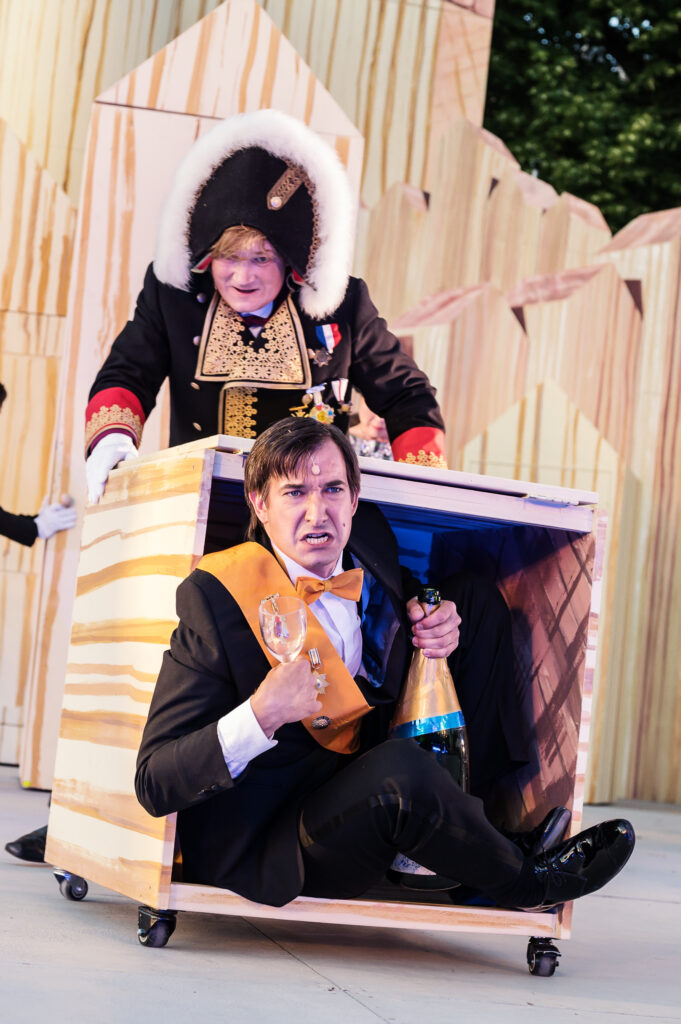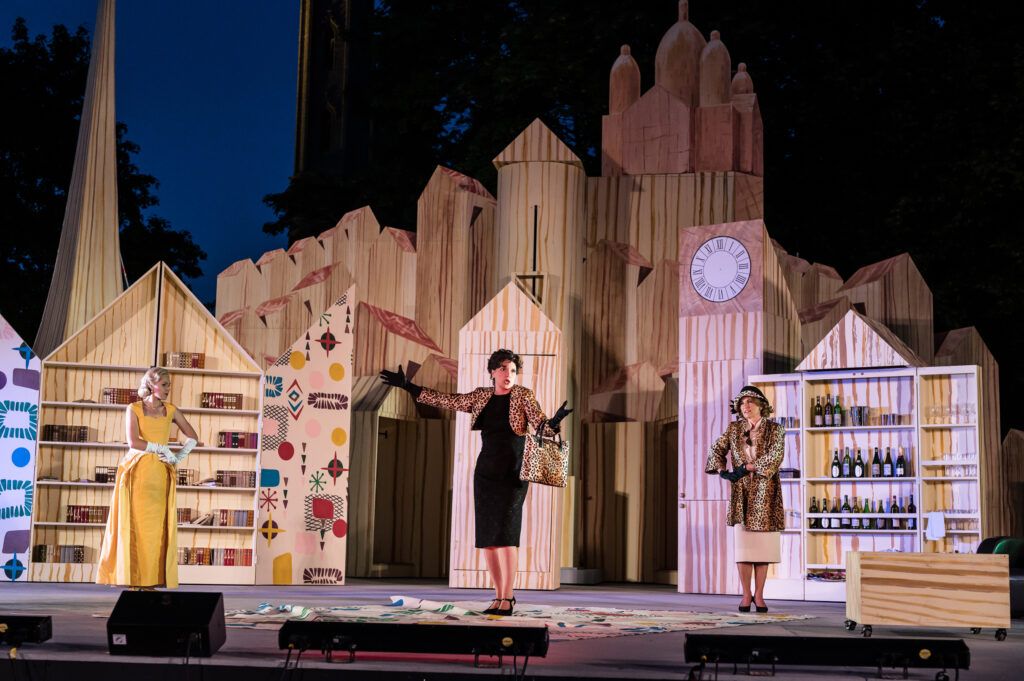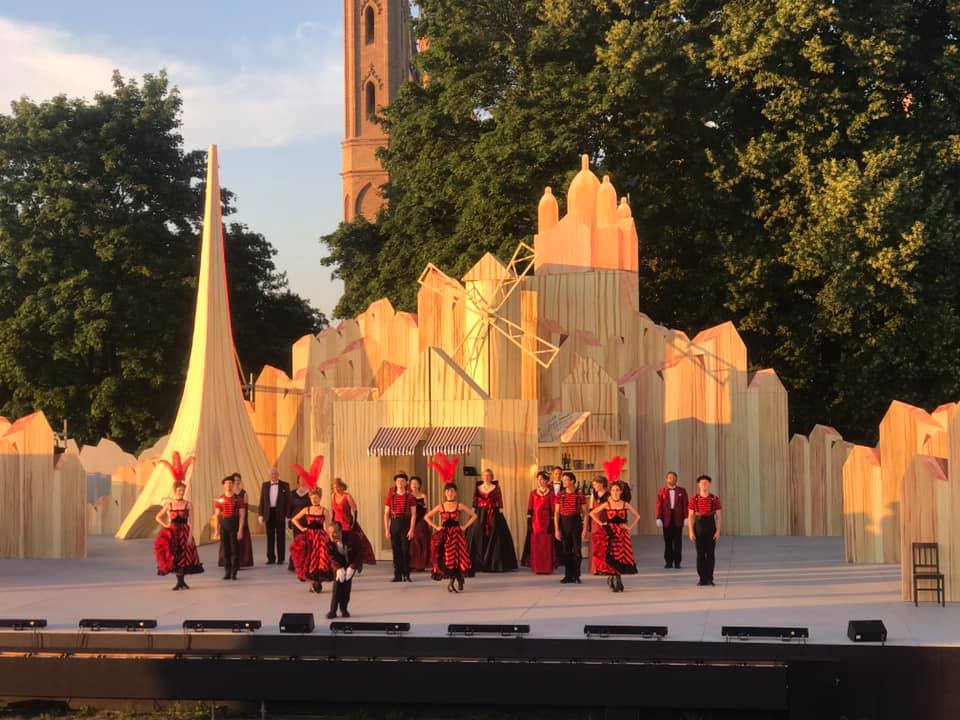Kevin Clarke
Operetta Research Center
7 July, 2021
The new intendant of the “Festspiele im Schlossgarten” in Neustrelitz – one and a half hours north of Berlin – decided to present the first Offenbach operetta ever there, in the former castle gardens by the lake. His choice fell on La Vie Parisienne, which is performed as Pariser Leben in the classic German translation of Karl Treumann. This week, the last round of performances commences, with an extra performance squeezed in due to popular demand. All performances have been sold out from the start.

Posters at the entrance to the festival in Neustrelitz. (Photo: Private)
While it’s great to see Offenbach make his belated debut at the festival’s 20th edition, the open-air staging by intendant Sven Müller could most politely be described as: uninspired.
Because the Baron and Baroness de Gondremarck are from Sweden, they are dressed in the typical IKEA colors yellow and blue. And, as an extension of that idea, the entire set representing their “vision” of Paris looks like a gigantic IKEA screw-it-together wooden set.

Sebastian Naglatzki as Baron de Gondremarck (front) and Ryszard Kalus as Urbain in “Pariser Leben.” (Photo: Jörg Metzner)
No doubt this could have been an interesting approach. But the director does not allow anyone in his cast to present an in-depth portrayal of their roles, with nuance or character. The opera singers are thrown onto the bare stage and left there to their own devices. No one is a great actor, which makes it almost painful to watch the dialogue scenes (re-written by Lür Jaenike, based on Timothy Knapman’s English “original”), and it makes it nearly impossible to understand who is what in relation to the others, which is especially sad given this story about fake identities and social hierarchies turned upside down. (For the full history of La Vie Parisienne and all background information, click here.)

Matthew Peña as Raoul de Gardefeu and Syrinx Jessen as Baroness Christine. (Photo: Jörg Metzner)
The most the “Regie” by Mr. Müller has to offer is having cancan dancers storm in every time the word “Paris” is uttered. Which is quite often. The small dance company then delivers a standard Moulin Rouge type of interlude, and leaves, as if they have nothing more to do with the story. (Choreography by Amy Share-Kissiov.)

The dance company. (Photo: Jörg Metzner)
The erotic dimension of the original plot is briefly hinted at when one of the IKEA boxes opens, revealing an attractive ballet dancer with his pants pulled down, standing there bare butted, bonking another ballet dancer. The fact that there’s also a lot of sexual tension between Métella as “a demi-monde woman” (played by Iuliia Tarasova) and Raoul de Gardefeu (played by Matthew Peña) is not evident because their love affair is nothing more than helpless gesticulating here. With rather bad German. The same is true for Baron de Gondremarck (Sebastian Naglatzki) and his flirting with the ladies at the 3rd act party, among them Marina Medvedeva as the yodeling glove maker Gabrielle. Why exactly she yodels is not clear, and that takes a lot of fun out of the piece. It is just presented as a revue of musical numbers, none of them take full flight.

Syrinx Jessen (Baroness Christine), Barbara Legiehn (Madame de Folle-Verdure) and Sylke Kamin-Urbanek (Madame de Quimper-Karadec) in “Pariser Leben.” (Photo: Jörg Metzner)
That might be because the acoustics – via microphone – do not bring out the best in the voices. And certainly not from the orchestra, seated behind a black curtain next to the stage and conducted by Hankyeol Yoon. He does not seem to know how to switch the famous numbers from this score into overdrive mode, and he never makes the dazzling finales take off.
Admittedly, this is Neustrelitz and not a production at some big fancy opera house. So, one should be careful with what one expects. But if you run a summer festival devoted to operetta – for 20 years – and if you have a blindingly beautiful setting in a park next to a lake at sunset, then your productions should show at least a minimum of love. Such love, for me, was not evident anywhere when I saw the performance last Sunday.

The dance company taking their bows after the “Pariser Leben” performance in Neustrelitz. (Photo: Private)
In the end, the only impressions that stuck in my memory where the bare butt of the ballet dancer. And a glorious coffee ceremony with French cakes in the garden of the Schlossgarten Hotel, where a small Offenbach exhibition is on display. That, by comparison, is done with minimal means but great love.
Next year, the intendant departs from the operetta repertoire of the past and will present Carmen at the “Festspiele im Schlossgarten” instead, more or less with the same singers as now, and with the same microphones.
For further details on Pariser Leben and performance dates, click here.
